 |
||||
Fostering Canadian Suzuki Teacher Connections: A Journeyby Karen-Michele Kimmett, (ON) Is it only a year ago (yet seemingly forever) since our lead article detailed our collective aspiration to figure out ways to bring Suzuki music lessons to every child as well as make teacher training more accessible for every aspiring Canadian teacher? Twelve long months later we are still in the throes of a terrible global pandemic that has brought much suffering, uncertainty and change for so many. For some Canadian Suzuki teachers, this year has also been a time to reach out, to strengthen our ties, to discuss and brainstorm new ways that we can bring supportive connection to both ourselves and our Canadian Suzuki families. Our list of accomplishments below may be short in the face of the multitude of current challenges; nonetheless, we’d like to take a moment to celebrate our efforts at connectivity:
We’ve also welcomed new colleagues from across the country to join our growing team of editors, translators, and steering committee members. If you have time to spare or if you would like to sit in on one of our meetings, please let us know. Our virtual door is always open! “Being part of the Newsletter Committee has been such a lovely experience. I often feel alone up here in the Yukon, but attending these meetings is a beautiful reminder that my students and I are part of larger community in the country and the world.” Katie Avery, Yukon Rep We’d love to hear from you! What are your concerns and questions? How has your program evolved and adapted this year? Have you been impacted by lower enrolment (or maybe higher numbers?!) Has the loss of performing opportunities affected your income? Has screen burnout been an issue for your studio? What creative ways have you found to balance the sometimes all-encompassing virtual reality we live in? It’s up to all of us to bring our unique Canadian Suzuki perspectives, goals, and languages to the table so that we become an even stronger Canadian Suzuki community and by extension a more vibrant member of the Suzuki Association of the Americas. We wish you good health and best wishes for a rejuvenating summer ahead.And remember to check out the many virtual SAA summer institute opportunities offered this summer including those offered by Canadian trainers. www.suzukiassociation.org The Canadian e-Newsletter Steering Committee “Part of the job of being human is just to try to spread light, at whatever level you can do it.”—Bruce Cockburn Visit our website for more information: www.canadiansuzukinewsletter.org Adaptation and Creativity: Seeing the pandemic from a different perspectiveby Thérèse Bécotte (QC) This pandemic took us all by surprise even though the scientific and medical communities had predicted it for a long time. For the love of music and children, we had to think and find solutions to new pandemic problems. There was no question of abandoning our students. Yes, it is possible to keep in touch with the students and keep them motivated. Online courses make it more difficult for us, but they allow us to see the child in his or her environment and suggest corrections if needed. Surprisingly, some students are more focused in virtual classes than in person classes. 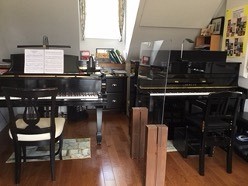 PRACTICALITY: From the beginning of the health measures, I offered online classes to all my students. Whether it was by Zoom, Facetime or Skype, the sound quality was far from optimal without specialized equipment. We were still able to finish the year and get together on Zoom to watch the students’ videos. This was a perfectly acceptable substitute. Two years ago, following a Suzuki training course, I decided to buy a second piano. It’s a big investment, but so great. Thanks to the new layout of my studio, when the restrictions were less severe, I installed a Plexiglas between the two pianos. New routine: Sanitizer and masks when arriving and leaving, keeping 2 meters apart while teaching, and the piano reserved for students was disinfected after each student. RECITALS AND ACTIVITIES: I am a member of the Ottawa-Gatineau Piano Suzuki Association. We have maintained our program of group activities and recitals. We have experimented with viewing live performances on zoom or video presentation. This was an interesting experience for students, teachers and parents. The fact that we came together to share these precious moments compensated a little for the lack of human contact we have had to endure for over a year. POSITIVE POINTS POST-PANDEMIC: BETTER HYGIENE: From now on, all music teachers will be more vigilant about basic sanitary measures. EASE OF OFFERING VIRTUAL CLASSES: It will be easy to replace an in-person class with a virtual one in case of health or transportation issues. All parents are now familiar with setting up their child for an online course. GROUP ACTIVITIES: Some activities, such as theory, history, or ear training, lend themselves well to small group online instruction, which may leave more time at the individual lesson for piano work. STUDIO EQUIPMENT: Multiple advantages of two pianos with or without a pandemic. HUGGING IS BACK! 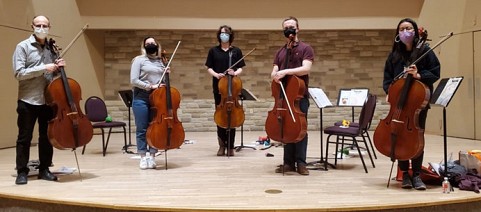 David Evenchick | Natasha Zado | Boet Zondag | Noah Schuster | Shannon Lai Celebrating Canada’s First Home-Grown Long-Term Cello Teacher Development Graduates!by David Evenchick (QC) In our Canadian Suzuki teacher community, we celebrate the energy, vision, commitment, and talent of our young teachers. With this in mind, I applaud the first cohort of graduates of Canada’s first long term cello teacher training program. The Suzuki Long Term Teacher Training program, offered for cello and violin,is an ongoing partnership between the Suzuki String School of Guelph and Wilfrid Laurier University. Our graduating cello class combined participants who grew up with Suzuki teaching with people for whom the Suzuki Method was completely new. We grew together, and students learned to help and support one another. In our Practicum, we came to value the perfection of open-minded imperfection in an imperfect world. In our DEIA (diversity, equity, inclusion, access) component we worked together to create the trust and vocabulary for difficult discussions. In short, participants developed some of the most important aspects of being a Suzuki teacher: building a community of trust and mutual respect, helping each other, and committing to life-long learning and excellence.  Here are some reflections, in their own words: There are only upsides to Suzuki teacher training! As someone who joined the course first time and completely new to the Suzuki method, I have learned an endless amount from my teacher and peers, I was able to connect/network to a community of teachers who are just as passionate, and I was given chances to implement what I learned into actual teaching opportunities through practicum. It has instilled a lot of confidence in my teaching. This course made me realize that teaching the next generation of cellists is a very rewarding experience. Taking the long-term Suzuki cello teacher development with Dr. Evenchick has been a character building and life enriching journey. My skills as a cellist and teacher have improved drastically through in-depth technique building, repertoire and supplementary materials, philosophical conversations, teaching and observation opportunities, and the bond we created as colleagues. This was an incredible opportunity for me to learn about the Suzuki method which is something I did not grow up (with). This course not only introduced me to the world of teaching but also helped developed my own personal playing. 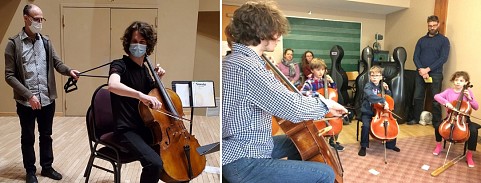 The future brings with it new possibilities for online training. Our vision is to bring Suzuki teacher development into the consciousness of our universities as a positive, practical, and perhaps essential skill. I wish to thank Susan Gagnon and Andrea Cook for lending their students for our Practicum. In addition, special thanks go to the music faculty at Wilfrid Laurier University and especially Professors Katie Schlaikjer (cello) and Jerzy Kaplanek (violin) for their unfailing support of this program. This coming September (2021), we will be starting new cohorts for both violinists and cellists. I am thrilled to announce that with a mix of live and online classes this program can be offered to participants in Montreal, perhaps Ottawa, Toronto, and Kitchener Waterloo. If you know of anyone interested in this program, please contact me, David Evenchick, cello, (evechickdavid@gmail.com) or Paule Barsalou, violin (paule@arset.net). My Journey from being a Suzuki Parent to becoming a Suzuki Teacherby Karen Zalter (QC) “Elle est dans la lune and she does not complete her work” is what my elementary school teachers wrote on my report cards every year. This was one reason why my parents refused to give me piano lessons, despite my asking. They finally agreed when I turned twelve and began high school. The effects of music lessons were amazing. Not only did I enjoy practicing (to the point where my family insisted that I stop and go do something else), but after my first semester, my academic grades had noticeably improved, and I no longer received the same feedback. Fast forward… When my eldest child was six years old, she asked for a violin. At the time, I thought she was too young. However, since she was persistent, I agreed to take her to a student violin recital that was advertised in the newspaper to see if she was genuinely interested. At the concert, I was in complete awe and the performance brought tears to my eyes. Watching children play in unison was magical to me. Having learned “traditionally”, with very strict teachers, I had never seen anything like it before. It touched my soul and I felt like I was witnessing harmony and love in its purest form. Needless to say, I registered my daughter for lessons. She loved learning with Vera and Dragon Djerkic and attending summer institutes, until she went off to university. As a parent, I quickly learned not to correct my daughter while she practiced. If I did, then the practice session was immediately over. My role, as a Suzuki parent, was to be her cheerleader and chauffeur. I was permitted to do quiet chores in the same room while she played violin, and sometimes, we played together, she on her violin and me on the piano. These times are amongst my most cherished memories. For many reasons, my children needed me at home after school and so I was fortunate to be able to observe their music lessons and sports activities. After several years, I decided it was time for a career change. I no longer wanted to be a bookkeeper/office manager. I wanted to become a Suzuki piano teacher. I enrolled in the Teacher Training program in Montreal, while my daughter attended the student violin program. It was there that I began studying with Dr. Merlin Thompson. Through my studies with Dr. Thompson, I have gained amazing technical skills and the ability to express my emotions through music, with confidence. I have completed the teacher training requirements for Volumes 1 – 4 and I am now teaching students of all ages and abilities. It brings me great joy to see my daughter and students, express themselves freely without judgement, while playing an instrument. Finally, I am proud to say that my daughter has just graduated from University, in Vocal Performance, and will be joining me in teaching violin, viola and voice this fall. On Being an Adult Suzuki Studentby Andrea Macdonald (AB) True musical joy could never have been possible for me without the Suzuki method. I have always been musical. Growing up, I sang in choirs, in musical theatre, and in pop bands. I joined a Balinese gamelan where we learned entire concerts by heart. I memorized very quickly and retained very well. My ear was my superpower. I was the first person “off book” in choir and my friends delighted in my ability to name any popular song in the first note or two. But, I could not read music. It wasn’t that I hadn’t tried. I’d taken piano and sight-singing lessons but these ended in frustration. When my husband, a professional musician, suggested I try a “one line” instrument I took up the recorder and fell in love with it. With only one stave to deal with, things improved somewhat. I joined a quartet and a large ensemble. My good ear served me well but I quickly hit a sight-reading wall. Despite help from my husband and years of faithful practice, I was frustrated and ashamed. It was emotionally difficult to practice and I felt stuck, always learning the notes and never getting a chance to work on the actual music. Finally, at 52, I got some psycho-educational testing done and was diagnosed with ADHD and something called a “severe visual processing disorder”. I needed a different approach. I didn’t think anyone would be willing to teach the Suzuki method to an adult but I found a wonderful teacher, Kathleen Schoen, in Alberta. We started lessons and I burned through Volume One on alto recorder in about two weeks, easily learning two to three songs per day. We added the soprano (recorder) book and I began working in both voices, on Volume Two. 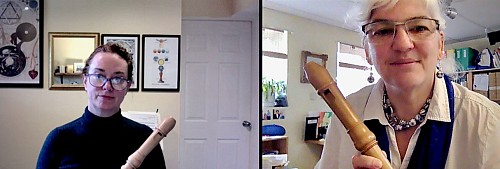 Here I received my first shock: one of the pieces (Bourrée from the Water Music Suite by G.F. Handel) was something I had just played with my large consort. How on earth could this be only Volume Two? But unlike before, I was not frustrated. I did not feel defeated. I teach seniors how to use technology such as iPads and iPhones. I spend quite a bit of time building good foundations before moving on to higher concepts. I was extremely impressed with the layout and careful scaffolding of the Suzuki method, which had a logical and gentle progression. The Suzuki method changed everything for me. Instead of dragging myself to the practice room to endure frustration and tears while trying to stay focused, I was now practicing for over an hour a day. My self-esteem soared! I was no longer dreaming of a future where I might one day be able to work on music that I loved. I was already doing it! I highly recommend the Suzuki method to any adult interested in learning music. I just wish there was a place for adult Suzuki students to chat. Like the kids, we need peers to accompany us on the journey. Silver Linings and Gold Standard Learning Opportunitiesby Jill LeBlanc (PE) Our family recently had the privilege of participating in a Workshop run by Etobicoke Suzuki Music. With previous Institute experience, we had an idea of what to expect, but there was one huge difference this time—it was completely virtual! Leading up to the workshop, my daughter’s face lit up, as she scrolled through photos of previous in-person Institutes and excitedly shared her memories with me. If I’m honest, I did my best to temper her excitement (and my own), because I didn’t know if it was possible to re-create the feeling of an Institute, online. The experience, strange yet familiar, would turn out to be another positive experience on our Suzuki journey. In practical terms, there were few surprises. We adapted quickly to using the technology, and the few glitches didn’t hamper our experience. The schedule included the usual elements; a parent class, a masterclass, a group class and an elective. The group class and masterclass were expertly taught as usual, and I was awed by how the instructors were able to quickly adapt to students’ varied needs over video conference! The format was engaging and we gained a ton of takeaways to apply to our home practice and support our studio instruction. While my child’s stop-motion elective was a completely new and surprising concept for me, in true Suzuki style, it stimulated her creativity and developed her sense of autonomy in ways I hadn’t expected. She loved every minute of it, and continued her project in the days that followed. I can’t ignore one huge advantage of the online format—the ability to observe other classes in a relaxed way, without fear of being disruptive. Thanks to Zoom, we were able to observe several additional sessions. With invisible status, I didn’t worry about trying (desperately) to keep my toddler quiet. Blissfully unaware, (though he runs to the music room when the Suzuki tracks play) he played freely while I devoted my attention to our Twinkler. I hadn’t considered enrolling our youngest, because I wasn’t convinced the online format would hold his attention the way in-person Institutes somehow do (even young Pre-Twinklers). His belly laughs during the Book 1 group class were so joyful, I couldn’t help but smile! They say, “people remember how they are made to feel.” After this workshop, we felt encouraged and motivated. Our children were reminded that they CAN do hard things, and that challenges help us grow. They loved it! As a parent, it felt good to connect with others through shared experience. Mr. Rob (Robert Richardson Jr.) said so genuinely, “I just LOVE playing the violin!”. I want this sentiment to be the strongest for my children throughout their unique Suzuki journeys. For our family, this Workshop brought the usual excitement and practical tips, but more importantly, momentum and motivation. The thrill of playing with others is just magical, and although the closing Twinkle resounded on one lone violin in our quiet home, the ripple effects of coming together to learn, will last much longer. Musings on Mason and Suzuki, from a Northern Parentby Marlon Davis (YT) “Education begins the day a child is born,” writes Dr. Suzuki. I have found a great resemblance between the educational philosophy of Suzuki and Charlotte Mason (the method we use to homeschool). Mason’s ideas breathed new life into the public educational system of the 19th century, and her influence continues today. Mason assured parents and teachers that, above all, children are born persons, not good or bad, but with possibilities for both. In the Mason method, it is nurturing that is paramount. Mason believed that education happens through the atmosphere of the home, the discipline of habits (formed thoughtfully and intentionally) and through the vitality of living ideas: all this can help a child thrive. Suzuki proposes that children are humans who thirst for knowledge and that this drive must be fed and nurtured by the atmosphere of the home. Whether this instinctive hunger is fed by music, nature study, or history, a child will take in this nourishment as easily as they digest food, as long as a rich feast is laid before them. Mason and Suzuki both knew that children do not want their musical, intellectual or physical appetite fed by an endless diet of pre-mashed pablum (hot cross buns forever!), sugary treats (a quick pop song learned by YouTube video) or by a chewy steak (a rich complex piece that is too hard to take in). And for what purpose is such a conscientious and nutritious feast laid before the child? For Suzuki it wasn’t just for the sake of beautiful music itself, but rather it was to “catch the hearts” of one another through this hearing and playing of truly good music. Mason called this magnanimity ‒ a “loftiness of spirit enabling one to bear trouble calmly, to disdain meanness and pettiness, and to display a noble generosity.” Mason wrote, “We begin to see what we want. Children make large demands upon us. We owe it to them to initiate an immense number of interests…that is to say, we should be in touch wherever we go, whatever we hear, whatever we see, with some manner of vital interest…. The question is not,––how much does the youth know? when he has finished his education––but how much does he care?” (Mason, School Education, p. 171). Yet, like all parents, I violate the principles listed above on a weekly if not daily basis. I forget my child is not a blank slate in which to stuff as much information and musical notes on a page as I can. I forget that I am educating my child through the atmosphere I create at music practice and beyond, for better or for worse. I create that air through my own good or bad habits, and by my daily success (or not) in recognizing that “every child is a wonderful creature, precious being” (Suzuki) and a complete person (Mason), the day they are born ‒ with all the dignity that status imbues. 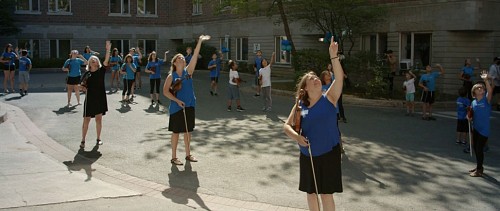 Resonanceby Venetia Gauthier, Karen-Michele Kimmett, Julia McFarlane (ON) Like so many Suzuki teachers across Canada, we at Canta Arya School for Strings have searched for ways to continue our musical and outreach programs, including our partnership with Providence Manor, a partnership featured in our just released documentary: Resonance: Music Across the Ages.  This short but powerful film tells the story of the eleven-year relationship between Providence Manor Residents and Canta Arya students, showing how even in the midst of the pandemic their unique relationship continued to bring mutual joy and connection. Our PM/CA musical partnership has blossomed in so many unforeseen directions, enhancing the lives of Manor PSWs, Canta Arya students, Manor administrators, teachers, alumni, parents, and researchers, as well as having an important impact on the greater Kingston community as a whole. We ourselves never imagined that the only open & safe ‘live’ concert venue in Kingston summer 2020 would turn out to be a circular driveway at a Long-Term Care Home! 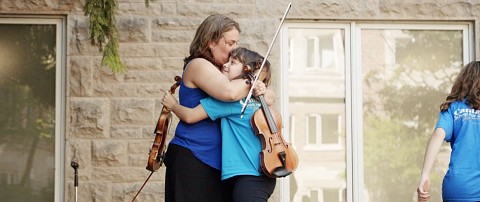 The 13-minute documentary ‘Resonance’ is a testament to the power of both music and intergenerational friendships to uplift and transform the lives of seniors, youth, care workers, and families. As Elizabeth Rouget, a Canta Arya Alumni and currently a doctoral student in Musicology at Princeton put it: “We play music for the love of music, and for the love of others.”  To view the documentary or receive more information on the collaboration, please visit: www.cantaaryastrings.com A Tale of Two Programs—Invasion Weekby Allison Warrian (MB) Situated 2.5 hours down the Trans-Canada Highway from each other, the Brandon Suzuki Talent Education Program (STEP) and Suzuki Music Winnipeg (SMW) have a history of collaboration. A few years ago, instructors from both programs spent a weekend together pursuing the Suzuki Principles in Action course. Over the years, many Brandon students have braved January blizzards to attend the SMW Winter Workshop, and Winnipeg students have enjoyed the summer heat at institutes held in Brandon. This past year, Brandon STEP and SMW both delivered programming online. While online teaching presents many challenges, it also offers a wealth of new opportunities. It was an exciting realization that the distance between our programs had been reduced to the speed of our internet connections. For the last week of February, our programs joined together and offered an event we called Invasion Week. We opened the links for all group classes in both programs – violin, viola, cello, piano, and guitar – and invited students to attend any class they wished. Students attended classes as Invaders or Spies. Invaders participated in any class working at their level or below. This was an opportunity to work on repertoire or review with a different teacher or instrument group. Spies were welcome to attend any class – to observe later-book classes and preview skills and pieces, or learn about other instruments. This event was an easy and free way for our programs to offer a workshop-like experience for our students. The class schedule and links were distributed to all families via email. Instead of registration, we asked students to rename themselves when signing-in to a class to include whether they were an Invader or Spy, and their instrument. This provided enough information for the instructors to gauge each student’s comfort level with participation, and find activities that would include everyone. Invasion Week presented a fun challenge for our instructors midway through a year of online teaching. The theme provided direction that spurred on our creativity. The teachers met once to brainstorm ideas and explore common repertoire for working with multi-instrument groups. This event was a great success. We had students from both programs attend a wide array of classes, and the teachers played along too. There were cellists in the guitar classes, violinists and violists in the cello classes, and students attending their-level classes in the other program. Early-book students observed and were inspired by more advanced students, and students reconnected with peers they had met at earlier events. The teachers had a great time too – observing, invading, and team-teaching each other’s classes. Brandon STEP and Suzuki Music Winnipeg are looking forward to other online events they have planned together for this spring. Online events are another tool that we can utilize in continuing to foster and strengthen the Suzuki spirit and sense of community that is so important to our endeavours. And it is one that we have embraced here in Manitoba. 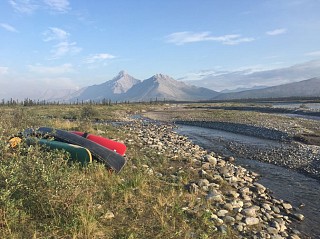 The Simultaneous Abundance and Austerity of Suzuki in the Northby Katie Avery (YT) The Yukon can be a place of contradictions. The warmest, most welcoming times may be had on the coldest and darkest days. You can go from being surrounded by civilization to being off the grid at a moment’s notice. It’s at once a place of abundance and austerity. Austerity We have no symphony. The closest community orchestra is a day on a ferry or a day in a car away and in another country. The closest professional one is 2-3 days in a car or a $400 plane ticket away. We have very few professional level classical players and most of them have other jobs, making it difficult to get them all together to play a concert and participate in the mentorship of the next generation. Our big venue, the only one with a stage big enough to hold a large group of strings, is in very high demand. All the most popular dates for end of term concerts are already blacked out by other community groups from now until the end of time. There is no violin luthier or store. It’s hard to come by instruments or supplies and repairs can be hard to arrange. Abundance We have an incredible amount of arts funding. I have personally received thousands of dollars to pursue Suzuki training and other opportunities. We also have an incredible performing arts facility complete with a fly gallery, orchestra pit, and full time technical staff. We have several black box theaters, as well as churches, schools, and community centers. We have a constantly growing pool of enthusiastic parents and students that I alone cannot possibly hope to keep up with. My studio is already full to overflowing with a long waitlist that just keeps getting longer. Even in Covid times, we can have in person lessons because our public health response has been impeccable. In fact, our chief medical officer is a truly excellent clarinet player as well as an incredibly compassionate medical practitioner. We have a music store whose owner is enthusiastic about increasing her stores resources to help out our small string community. She will take instruments on consignment to make swapping easier. We also have a guitar maker who can do minor repairs on violins. The Plea Online Group Lessons in times of Pandemicby Mélanie Grenier (QC) The pandemic has hit every continent, every country, every family in the world in some way. In reality, everyone has lost many routines, points of reference, relationships. The joys of life have slowly changed, evolved, and families have adapted. As a Suzuki teacher, last spring, I was ready and used to teaching online, since I had been doing it for several years with some families. I continued to give private lessons, without any break, even if it was demanding! For group lessons, I decided to wait, thinking that everything would be back to normal in the fall… When in the fall, we had to readjust to the fact that assemblies were once again prohibited, I dove in! I wanted my students to continue to have the regularity, the motivation, the learning, and the “group classes” that were so beneficial to the families. I adapted my teaching style and lesson content in a major way, and creativity was put to good use! One of the priorities in my group teaching was to do more for the parents, to coach them, to give them fresh ideas about working with their child, and to work on the elements of violin playing. The same goals for many things, but packaged in a different envelope! I also integrated new elements, such as proposing small eutony exercises to make them aware of it, introducing them to the great violinists/composers in the form of games that I created, exploring the more advanced repertoire by making lists of pieces that we like to listen to and suggesting them to others… We created group idea banks on different subjects: how to make practices successful, tips to improve a piece… We examined music theory, not to mention all the repertoire that we reviewed in all sorts of creative ways! I also integrated complementary repertoire with my more advanced groups. On Hallowe’en, we did solos in costume. For our Christmas Concert, we prepared a video montage of all the students performing as a soloist or in a small group. The video was shared with our extended families and will remain a fond memory for everyone. In addition, to finish off 2020, we had a “Suzuki Revisionothon”, a morning when we went through the repertoire in order, from Books 1 to 7. The kids joined in with what they knew and then listened to the repertoire played by the more advanced students while eating lunch, drawing, keeping busy… Some were so motivated that they tried to play the pieces they didn’t know! Beautiful moments for the students and a source of replenishment in this period when many things are not allowed! Music can go far beyond these prohibitions and still touch the heart, as Suzuki so well pointed out. Complementary List of the Suzuki Viola Method – Canadian Contributionby Pierre Yves Gagnon (ON) During the fall of 2019, Betsy Stuen-Walker asked me to compile repertoire suggestions for a complementary list of pieces to the Suzuki Viola Method, volumes 4-9. This was an interesting and challenging project. My goal in this exercise was to find original works written for the viola, although transcriptions are unavoidable since they make up most of the viola repertoire. I also looked for works by Canadian composers to add a Canadian flavour to this list. One of the criteria for my search was to include works that are easy to find since this additional list will be consulted internationally. Most of the pieces in my compilation are published by well-known publishers. Another criterion was to choose compositions that would appeal to each level. Finding Canadian pieces written for young violists that meet these criteria was difficult. Most of the Canadian compositions I found were either too difficult to play or hard to find. The viola is not often considered an instrument of choice for young students. My sources were my own collection, the Royal Conservatory of Music curriculum, Frederick Harris’ viola publications, and the Canadian Music Centre. I chose compositions by three composers: Christine Donkin, Patricia Bloomfield Holt and Arthur Bachmann. My choice of pieces is selected according to the different levels corresponding to the Suzuki volumes. Each of the listed pieces includes the name of the composer, the name of the publisher and a brief description. To keep this short, I will publish it through several editions of the Canadian Suzuki Newsletter. Suzuki Viola Method, Volume 4 Piece: Andante Religioso Piece: Une Larme Highly Recommended Reading from Merlin B. Thompson’s Bookshelfby Merlin B. Thompson (AB) The Music Advantage by Anita Collins (2021). Written by an award-winning educator and researcher, this informative book explains how music has the potential to benefit nearly all aspects of a child’s development. SECE teachers will be delighted to learn how music stimulates brain development, language acquisition, and prepares children for school. Suzuki instrumental and vocal teachers will be interested to know how Collins responds to the question: What message are teachers and parents sending when they let children quit music studies because it’s no longer fun or becomes too hard? Breath by James Nestor (2020). There is nothing more essential to our health and well-being than breathing. Not to mention what happens when music performance is plagued by inadequate or strained breathing. No matter what you eat, how much you exercise, how young or strong you are, none of it matters if you’re not breathing properly. Drawing from thousands of years of medical texts and recent cutting-edge studies in pulmonology, psychology, biochemistry, and human physiology, Breath turns the conventional wisdom of what we thought we knew about our most basic biological function on its head. Suzuki teachers will never breathe the same after reading this book. How We Learn by Benedict Carey (2015). Make It Stick by Peter C. Brown, Henry Roediger and Mark McDaniel (2014). These two books sift through decades of education research and landmark studies to uncover the bold truth about how our brains absorb and retain information. As it turns out, many of the most common learning strategies and practice routines music teachers and students employ are actually counterproductive and less beneficial than we think. Drawing from recent discoveries in cognitive psychology and brain development, the authors offer a solid selection of concrete techniques for becoming more productive learners. If you’re a Suzuki teacher who has ever wondered why students’ progress doesn’t go according to plan, these books masterfully fill in the gaps. You’ll never make the same assignments after reading these books. Starting Suzuki Beginners Online – Progress Reportby Flory Godinez (BC) As the months of pandemic seclusion have crept slowly by, my husband and I have been busy building the online “Beginner Box Violin and Pre-Bow Course” for MapleNorthStrings.ca.) The results have been surprising. The first course is completed with 14 lessons. Several lessons of the second course, “Violin 1a,” are now loaded on the MapleNorthStrings.ca website. 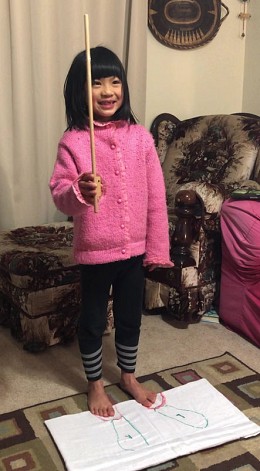 The surprise is that the first student and her parent/coach learned the pre-violin skills required to graduate to the real violin just as well as if she had received face-to-face lessons. I was flabbergasted! I had not expected this level of proficiency from an online course having no live interaction with the student and parent. This family and I settled into a routine where approximately once a week they sent me short Dropbox videos. I would dash back a simple email explaining the corrections that were needed. Once I attached a close-up picture of the beginner bow hold and, because there had been confusion over this skill, I filmed a detailed and longer segment with a better close-up of the bow hold for the next online lesson. The comments I received from them helped improve the clarity of the lessons. As the family said in their feedback: We’ve really liked Maple North Strings, particularly the flexibility of it and having more control over pacing. There is the ability to complete the whole or part of the lesson at a time. I have found that in pre-COVID times, a lot of the kids’ extracurricular activities occurred at or close to supper time which often resulted in a rushed supper or not being able to eat together as a family. Having the flexibility of being able to watch and practice around our weekday supper time has meant less stress for all of us. Having the ability to watch the lessons or portions of the lessons over again has also been beneficial. It has also been really helpful to get your feedback and support with the Dropbox videos. I’m glad that you showed us how to send those video clips as I don’t think it would have been as effective if we were only sending pictures or updating via written text. The lessons in the Beginner Box Violin course cover sequential pedagogy, music reading, practice games, practice tips, Suzuki philosophy and inspiring anecdotes to encourage the parent coach. Having laid this foundation of the crucial philosophy I’m now adding short inspiring vignettes based on “Shinichi Suzuki’s Daily Calendar.” In this long drawn out Covid situation fraught with isolation, I believe parents need all the encouragement we can give them. No matter what instrument we teach there is a treasure trove of inspiration we can access and impart from the writings of Dr. Shinichi Suzuki. ANNOUNCEMENTSThomas Wermuth Retirement Announcementby Sally Gross (IL) Prior to joining the Western Springs School of Talent Education (Illinois) faculty as the Artist in Residence in 1989, Thomas Wermuth was an active part of the Guelph/Kitchener/Waterloo musical community for many years. After graduating from the Juilliard School in 1973, Mr. Wermuth accepted a position with the Canadian Opera Company never anticipating that he would remain in Canada for many years. A couple of years later he became the Assistant Concertmaster with the Kitchener-Waterloo Symphony, later moving over to Principal Violist. The KWS was and remains, a tightly-knit family of musicians and Mr. Wermuth is still in close contact with many of the members, especially his good friend Martha Kalyniak. The birth of his daughter Allegra in 1974 remains a highpoint of his life. In addition to playing in the Symphony, Mr. Wermuth began teaching with the Suzuki String School of Guelph (1975-1987). The school’s director, Daphne Hughes was one of the pioneers of the Suzuki movement in Canada and was a co-founder of the SSSG in1972. She thought that the Suzuki community would be a good fit for him, and she was correct. Mr. Wermuth did his Suzuki training with Kay Collier Slone (McLaughlin) at the University of Louisville in the late 70’s. Mr. Wermuth was a co-Director of the first Guelph Suzuki String Institute (now the Southwestern Ontario Suzuki Institute) in 1983. By this time, Mr. Wermuth was highly sought after as a guest clinician throughout Canada and the US. Upon leaving the Guelph school, he continued to teach in the Kitchener-Waterloo area until leaving for the Chicago suburbs in 1989 at the invitation of Edward Kreitman. During his years of teaching in the Guelph/Kitchener/Waterloo area, Mr. Wermuth worked with many young musicians who to this day see him as one of the most influential people in their lives. The list is long, but no less indebted to him than his WSSTE students. So in addition to Mr. Wermuth’s illustrious teaching career of 32 years at the WSSTE, add an additional 14 years of teaching in Canada for a total of 46 years of commitment to building the next generation of not only wonderful musicians and teachers, but fine human beings who all adore him. We all wish him the best as he starts the next journey of his life in Colorado. For further information about upcoming celebrations, letters of congratulations, photos and videos please visit: https://www.wsste.com/wermuth Suzuki Trumpet Announcement!by Natalie DeJong (AB) After many, many years of work, the Suzuki Trumpet School Volume 1 is now available! The prototype was initiated by Ann-Marie Sundberg from Sweden and has been in use—in its various forms and stages of development, by all Suzuki trumpet teachers and students worldwide since 2013. Every single trumpet teacher who has taken Suzuki trumpet teacher training either through the ESA or the SAA has contributed expertise to the project. A HUGE thank-you to all the teachers, students, and parents who have played such an integral role in this book becoming a reality! The Suzuki Brass Committee has been working diligently with Alfred Music to edit, revise, and edit again, right down to the color of the stripe on the front cover. (We liked the happy green option.) We also met in Indianapolis, USA for the recording of the repertoire with artists Caleb Hudson (trumpet, Canadian Brass), and Michael Schneider (piano) in October 2019. What an amazing opportunity and privilege it has been to contribute to this book, one that will introduce the Suzuki Method to the world of brass players. Again, a HUGE thanks to all the ‘players’ on this project! Available directly from Alfred Music: [Click here] Official launch from Alfred Music: [Click here] Soon to be available on SmartMusic. From Merlin B. Thompson (AB) Let’s Talk About Music Teaching: Conversations to Inspire and Inform (available on YouTube) is a video series featuring Shu-Yi Scott (cello) and Merlin B. Thompson (piano) as they discuss the challenges of music teaching. With over five decades of cumulative Suzuki teaching experience, this duo offers practical insight and understanding into an entire spectrum of topics. With frequent examples and anecdotes from their real-life studios, Shu-Yi and Merlin address issues of essential interest to Suzuki music teachers. Fundamental Piano Technique (available on YouTube). Created by Suzuki Piano teacher trainer Merlin B. Thompson, this video series treats piano technique as something we already know about because of how we use our body in everyday life. With ideas that span students’ entire development from beginner to beyond, Fundamental Piano Technique offers a fresh view of piano technique with easy-to-understand language and gestures that all students may master. SECE Curriculum Revision Courseby Sharon Jones (ON) Since May 16th, 2021, there have been several opportunities for SECE teachers to take a SECE Curriculum Revision Course. The courses will continue to be available to any SECE teachers who have previously registered a minimum of ECC and SECE Stage One training with the SAA. Revisions to the SECE curriculum have been underway since July 2020 with a focus on bringing diversity, equity, inclusion, and access to the Suzuki Early Childhood Education Classroom. The SECE Curriculum Revision Courses will be taught in teams of two Teacher Trainers including Sharon Jones, Lynn McCall, Wan Tsai Chen, & Danette Warren Schuh. Each course will be 5 hours in length, over one day, with a maximum of 30 participants. The platform for these courses will be Zoom. The fee per course/per person will be $85 and SECE teachers will be able to register the course with the SAA. Here is a link to all the upcoming SECE Curriculum Revision Course Dates: [click here] Check out our website for information about upcoming Institutes and Teacher Development opportunities in Canada: www.canadiansuzukinewsletter.org |
||||
|
You received this message because you are a member or supporter of the Suzuki Association of the Americas. Suzuki Association of the Americas |
||||